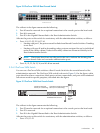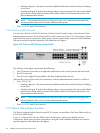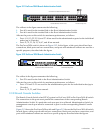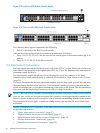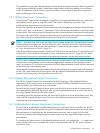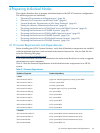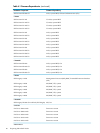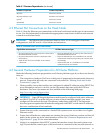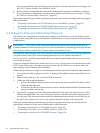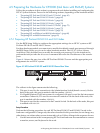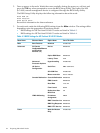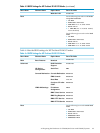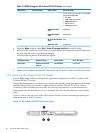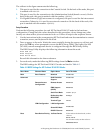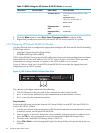
Table 4-1 Firmware Dependencies (continued)
Firmware DependencyHardware Component
Firmware versionMyrinet
Interface card versionMyrinet interface card
Firmware versionQsNet
II
Firmware versionInfiniBand
4.2 Ethernet Port Connections on the Head Node
Table 4-2 lists the Ethernet port connections on the head node based on the type of interconnect
in use. Use this information to determine the appropriate connections for the external network
connection on the head node.
IMPORTANT: The Ethernet port connections listed in Table 4-2 do not apply to hardware
configurations with HP server c-Class blades and enclosures.
Table 4-2 Ethernet Ports on the Head Node
All Other Interconnect TypesGigabit Ethernet Interconnect
• Physical onboard Port #1 is always the connection to
the administration network.
• Physical onboard Port #2 is available for an external
connection if needed (except if the port is 10/100, then
it is unused).
• Add-on NIC card #1 is available for an external
connection if Port #2 is 10/100.
• Physical onboard Port #1 is always the connection to
the administration network.
• Physical onboard Port #2 is the connection to the
interconnect.
• Add-on NIC card #1 is available as an external
connection.
4.3 General Hardware Preparations for All Cluster Platforms
Make the following hardware preparations on all cluster platform types if you have not already
done so:
1. The connection of nodes to ProCurve switch ports is important for the automatic discovery
process. Ensure that all nodes are connected as described in “Making Node and Switch
Connections” (page 45).
2. When possible, ensure that switches are configured to obtain IP addresses using DHCP. For
more information on how to do this, see the documents that came with the ProCurve
hardware. ProCurve documents are also available at the following Web page:
http://www.hp.com/go/hpprocurve
IMPORTANT: Some HP Integrity hardware models must be configured with static addresses,
not DHCP. For HP XC systems with one or more of these hardware models, you must
configure all the nodes with static IP addresses rather than with DHCP. The automatic
discovery process requires that all nodes be configured with DHCP or with static IP addresses,
but not a combination of both methods.
3. Ensure that any nodes connected to a Lustre® file system server are on their own Gigabit
Ethernet switch.
4. Ensure that all hardware components are running the correct firmware version and that all
nodes in the system are at the same firmware version. See “Firmware Requirements and
Dependencies” (page 59) for more information.
5. Nagios is a component of the HP XC system that monitors sensor data and system event
logs. Ensure that the console port of the head node is connected to the external network so
4.2 Ethernet Port Connections on the Head Node 61



